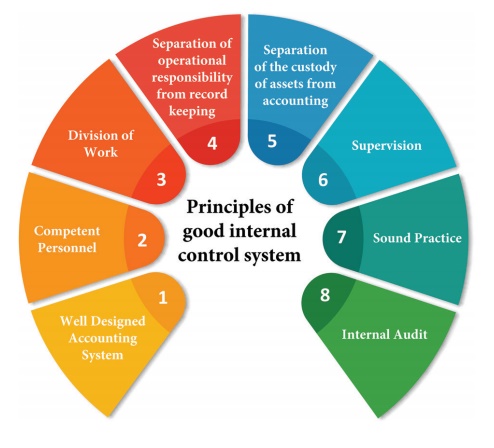Auditing - Principles of Good Internal Control System | 12th Auditing : Chapter 2 : Internal Control
Chapter: 12th Auditing : Chapter 2 : Internal Control
Principles of Good Internal Control System
Principles of Good Internal Control System

An
effective or good system of internal control should have the following
principles: -
1. Well-designed Accounting System: Internal
control should provide for a well designed accounting system. The financial and
accounting activities must be separated. For example, person who is responsible
in handling cash (cashier) and the person who accounts cash (accountant) should
be done by two different persons.
2. Competent Personnel: In any
internal control system, personnel
are the most important element. When the employees are competent and efficient
in their assigned work, the internal control system can be worked and operated
efficiently and effectively even if some of the other elements of the internal
control system are absent.
3. Division of Work: This
refers to the procedure of division
of work properly among the employees of the organization. Each and every work
of the organization should be divided in different stages and should be
allocated to the employees in accordance with their skill and expertise.
4. Separation of operational responsibility
from record keeping: If each department of an organization is being assigned to prepare its own records
and reports, there may be a tendency to manipulate results for showing better
performance. In order to ensure reliable records and information,
record-keeping function is separated from the operational responsibility of the
concerned department.
5. Separation of the custody of assets from
accounting: To protect against
misuse of assets and their misappropriation, it is required that the custody of
assets and their accounting should be done by separate persons. When a
particular person performs both the functions, there is a chance of utilizing
the organisation’s assets for his personal interest and adjusting the records
to relieve himself from the responsibility of the assets.
6. Supervision: Directors should review the company’s financial operations and
position at regular and frequent intervals. Comparison with results for
previous periods indicates discrepancies that call for further examination.
Where budgetary control is in use, attention will be drawn to material
variances and explanations required. From time to time, special reviews of
particular items such as stocks, or the operation of the wages department,
should be undertaken.
7. Sound Practice: Sound practices of administration require that
established procedures, policies and delegation of responsibility should be
open to all employees of the organisation. This helps in avoiding questions,
attempts to shift responsibility for unsatisfactory performance etc.
8. Internal
Audit: Internal audit is a
part of the
whole system of internal
control. It should
operate independently of the internal check and in no circumstances; it
should divert any one
of responsibilities placed on
him. It is the examination of accounts of a business concern
by its employees specially appointed for the purpose. It is an independent
appraisal of activity
within an organization for
the review of accounting, financial and other business practices.
Related Topics